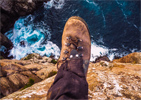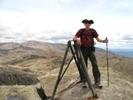The things that need to be changed - like proper funding for the Parks and appropriate use of that funding - won't be. This is part of a battle that's been going on ever since P&W was established.
Maybe I'm just too old and cynical, but whatever happens, it won't be good for the Parks themselves. The staff might survive, the tourists will be pandered to, the Government will continue to find more ways to wring every last dollar out of visitors and locals, but the Parks will continue to hang on by their dirty broken fingernails, with the least possible amount being done on genuine conservation and protection work.
Parks Department abolished/slashed
Forum rules
Tasmania specific bushwalking discussion. Please avoid publishing details of access to sensitive areas with no tracks.
Tasmania specific bushwalking discussion. Please avoid publishing details of access to sensitive areas with no tracks.
41 posts
• Page 2 of 2 • 1, 2
Re: Parks Department abolished/slashed
"Mit der Dummheit kämpfen Götter selbst vergebens."
-

north-north-west - Lagarostrobos franklinii

- Posts: 15492
- Joined: Thu 14 May, 2009 7:36 pm
- Location: The Asylum
- ASSOCIATED ORGANISATIONS: Social Misfits Anonymous
- Region: Tasmania
Re: Parks Department abolished/slashed
I can tel lyou one thing, it aint going to be good for the Environment. It's all about jobs, tourism and money, and it sure isn't about the devils and the quolls.
- the_camera_poser
Re: Parks Department abolished/slashed
Looks like some folks are starting to use things like facebook to support Parks
http://www.facebook.com/pages/Tasmania-Parks-and-Willdife-Service/78181668425?ref=nf
Might be worth showing some support
Disclaimer - I work for Parks but did not start the site.
http://www.facebook.com/pages/Tasmania-Parks-and-Willdife-Service/78181668425?ref=nf
Might be worth showing some support
Disclaimer - I work for Parks but did not start the site.
-

tastrax - Lagarostrobos franklinii

- Posts: 2030
- Joined: Fri 28 Mar, 2008 6:25 pm
- Location: What3words - epic.constable.downplayed
- ASSOCIATED ORGANISATIONS: RETIRED! - Parks and Wildlife Service
- Region: Tasmania
Re: Parks Department abolished/slashed
A point to consider (off topic) - What do Parks and Wildlife actually have to do with Wildlife management???
As far as I can tell, absolutley nothing, or very little at best. Perhaps a name change is in order. Parks and Tourism perhaps?
As far as I can tell, absolutley nothing, or very little at best. Perhaps a name change is in order. Parks and Tourism perhaps?
- Joel
- Athrotaxis cupressoides

- Posts: 210
- Joined: Mon 07 Jul, 2008 9:27 pm
- Region: Tasmania
Re: Parks Department abolished/slashed
Your Right Joel. When PWS was split from DPIWE, all of the wildlife management type people (and resources) stayed with the new DPIW. PWS staff were then only involved in wildlife issues under a Memorandum of Understanding with DPIW. Now that the Parks are going back to DPIW, at least the wildlife expertise and the onground staff (PWS) will again be in the same department so perhaps, maybe, possibly a more coordinated aproach to wildlife issues may eventuate...
-

almontyrat - Nothofagus cunninghamii

- Posts: 3
- Joined: Tue 14 Apr, 2009 10:29 am
- Location: Ulverstone
- Region: Tasmania
Re: Parks Department abolished/slashed
almontyrat wrote:Your Right Joel. When PWS was split from DPIWE, all of the wildlife management type people (and resources) stayed with the new DPIW. PWS staff were then only involved in wildlife issues under a Memorandum of Understanding with DPIW. Now that the Parks are going back to DPIW, at least the wildlife expertise and the onground staff (PWS) will again be in the same department so perhaps, maybe, possibly a more coordinated aproach to wildlife issues may eventuate...
Well that is a positive.
- the_camera_poser
Re: Parks Department abolished/slashed
Sorry folks I've come in late,
as someone heavily involved in 'the media' industry in this state and also with 'contacts' within the public service, this is something I know they have been working on since the time of Big R**, in order to quash the independence of funding distribution of the old department they wanted a MEGA-DEPARTMENT all along, under the gathering storm of the 'GFC' they now have the excuse to do it.
The upshot of it all is yes P&W will lose more funding and be subjected to the pressure of the other stakeholders in the MEGA-DEPARTMENT.
Sorry to say but the effect will become more obvious over the next couple of budgets and the effect will be felt on the ground soon.
Answer: ???
as someone heavily involved in 'the media' industry in this state and also with 'contacts' within the public service, this is something I know they have been working on since the time of Big R**, in order to quash the independence of funding distribution of the old department they wanted a MEGA-DEPARTMENT all along, under the gathering storm of the 'GFC' they now have the excuse to do it.
The upshot of it all is yes P&W will lose more funding and be subjected to the pressure of the other stakeholders in the MEGA-DEPARTMENT.
Sorry to say but the effect will become more obvious over the next couple of budgets and the effect will be felt on the ground soon.
Answer: ???
The idea of wilderness needs no defense, it only needs defenders ~ Edward Abbey
-

stepbystep - Lagarostrobos franklinii

- Posts: 7625
- Joined: Tue 19 May, 2009 10:19 am
- Location: Street urchin
- Region: Tasmania
- Gender: Male
Re: Parks Department abolished/slashed
Content removed by poster
Last edited by Ent on Thu 11 Nov, 2010 12:02 pm, edited 1 time in total.
"lt only took six years. From now on, l´ll write two letters a week instead of one."
(Shawshank Redemption)
(Shawshank Redemption)
-

Ent - Lagarostrobos franklinii

- Posts: 4059
- Joined: Tue 13 May, 2008 3:38 pm
- Region: Tasmania
Re: Parks Department abolished/slashed
muka wrote:Let's abolish the State.
I can't see an emoticon so I'm not sure just how to take this statement, but I can't believe any Tasmanian would seriously suggest this.
Tasmania would just be a quaint little island off the southern coast of Australia and pretty much forgotten if it weren't for the fact that we are a state. We have 12 Senators and equal representation with ever other State which is something that no other group of 500,000 citizens enjoy. We receive a disproportionate share of the national wealth - because we are a State. The largest contributor to Tasmanian Government's revenue is Federal grants and subsidies. Statehood is possibly the most precious asset we have, and not something to be lightly dismissed. We enjoy the live style we have, because we are a State - and not just another rural municipality in country Victoria - or forgotten offshore island.
...but thats not the main theme of this thread so I'll avoid the temptation to rant.
In a way, bushwalkers are just pedestrian tourists. When you are out walking, aren't you just another gawker? 85% of people who come to Tasmania visit at least one National Park, so it is often argued that far fewer people would come if we didn't have National Parks. Not sure about that logic. It is true however that Parks are important to Tourism and Tourism is important to our ecomonmy (about $1.3 billion pa).muka wrote:So what can bushwalkers contribute? ...As for Tourism, it sucks. ...and probably is over-rated as an earner.
The point of having a "Parks" department or national parks system or anything like it, is to protect our unique, endemic ecosystems and to "manage" the areas we are trying to protect. To preserve the biodiversity. Not for our sake so we can go bushwalking, nor for the sake of others, but for the sake of the plants, the animals, the environment and the planet. The whole world is richer when we protect and preserve the natural biodiversity.
I don't know how true the speculation is, but to some extent I support this position. I know that when I am preparing for a walk I like to find maps and information about the walks and tracks, but publicity brings its own problems. There is this inevitable cycle. If a track appears on one map it will eventually appear on others, and eventually online (Google Earth etc). More people find the track and therefore more people use the track. The track deteriorates. People complain about the condition of the track. If the track is improved more people will use the track. More deterioration, more complaints. So more "improvements" are necessary. Then more people, so now we need shelter and toilets and other "improvements". More people. Each and every change irrevocably changes the natural environment and impacts on the ecosystem. Just look at what has happened - is happening - to the OT - more boardwalk, bigger huts, more people. And now people "expect" these things to be there when they walk in the wilderness. Look at what people complain about. ..there is not enough boardwalk! ..I tripped on a root! ..there were too few toilets! ..we got wet and muddy! ..there was not enough coal for the fire! ..the huts were too crowded! ..its too far between huts! ..there aren't enough rangers about! How long will it be before there is a wind generator at every hut, electricity, hot and cold water, and mobile phone towers?brett wrote:It has been speculated that Parks and Wildlife is working with Tasmap to remove tracks and huts from the maps.
mein Gott! New flash - Its a wilderness people, not a Mall. I hope that other tracks in Tasmania aren't subject to the same "improvements", but I fear this is exactly what will happen to the Walls and Frenchman's Cap.
johnw wrote:Sadly I think economic circumstances will mean that conservation will take a back seat to opportunistic money grabbing for a long time to come. We seem to be heading that way in NSW (and that started even before the GFC).Singe wrote:exploitation will always be more politically palatable than conservation - all the more so during a recession.
This is the difficulty with conservation (or preservation) of the natural environment. By itself it does not make any money. In the modern world government departments have to generate income. So conservation has to get into bed with Tourism or some other revenue earner.
Perhaps the solution is to just lock these areas up and not allow anyone in there at all?
- walkinTas
- Lagarostrobos franklinii

- Posts: 2918
- Joined: Thu 07 Jun, 2007 1:51 pm
- Region: Tasmania
Re: Parks Department abolished/slashed
walkinTas wrote:New flash - Its a wilderness people, not a Mall. I hope that other tracks in Tasmania aren't subject to the same "improvements", but I fear this is exactly what will happen to the Walls and Frenchman's Cap.johnw wrote:Sadly I think economic circumstances will mean that conservation will take a back seat to opportunistic money grabbing for a long time to come. We seem to be heading that way in NSW (and that started even before the GFC).Singe wrote:exploitation will always be more politically palatable than conservation - all the more so during a recession.
This is the difficulty with conservation (or preservation) of the natural environment. By itself it does not make any money. In the modern world government departments have to generate income. So conservation has to get into bed with Tourism or some other revenue earner.
Excellent post wT. You articulate all of the issues that you covered very well. I mentally struggle with this stuff all the time but have to concede that there probably has to be a compromise at some point. I belong to a conservation/bushwalking organisation. I generally agree with them but sometimes get frustrated when their stated position becomes too extreme for me.
walkinTas wrote:Perhaps the solution is to just lock these areas up and not allow anyone in there at all?
I know you don't actually mean that. It would surely be the surrender of natural areas to exploitation by commercial interests IMHO. As has been said elsewhere I think, if no one can go there then why would they care about it? Seeing can lead to understanding but unfortunately it also contributes to the very problems identified. So what is the answer? I really don't know but I do think we need to continue to resist blatantly inappropriate development yet still somehow provide tourism opportunities with minimal impact.
John W
In Nature's keeping they are safe, but through the agency of man destruction is making rapid progress - John Muir c1912
In Nature's keeping they are safe, but through the agency of man destruction is making rapid progress - John Muir c1912
-

johnw - Lagarostrobos franklinii

- Posts: 9684
- Joined: Wed 23 Jan, 2008 11:59 am
- Location: Macarthur Region - SW Sydney
- Region: New South Wales
- Gender: Male
Re: Parks Department abolished/slashed
johnw wrote:I belong to a conservation/bushwalking organisation. I generally agree with them but sometimes get frustrated when their stated position becomes too extreme for me.
Getting the balance right is so hard. Every action has a consequence - "The Consequence Engine" - "Karma" - call it what you will, but you can't walk in the wilderness without changing it.
I hear what you're saying about the extreme positions. ...But I better not start yet another sidetrack.
johnw wrote:walkinTas wrote:Perhaps the solution is to just lock these areas up and not allow anyone in there at all?
I know you don't actually mean that.
You are right, out of sight and out of mind is not good. There are plenty of examples around the world of forest that have disappeared for ever because no one was watching. I suspect the walks through the Styx, Weld and Florentine valleys in Tassie would be different if no one was watching.
I liked what I read in the BATR Report. I like the idea that some tracks should not be publicized (T4) and some should remain basic tracks with minimal or no facilities and not maintained beyond the need to prevent environment damage (from erosion, runoff and the like). If walkers knew that a track is deliberately kept in a very basic form - and understood why - then maybe less people would go there or at least there would be less complaints from those who did use the track. And maybe fewer detrimental comments by media and tourist groups about tracks not being maintained, just because they don't met someones expectations.
It is the difference between "maintaining" a track and "improving" a track. IMO tracks like the Never-Never should be maintain just like they are now, maybe one or two more markers so that people stayed on track, - no widening of the track, no artificial steps, no boardwalk over the muddy bits, no bridges over the river, no sign posts along the way - but maintained just to minimise environment damage. If the damage gets too much, then maybe close the track for a period which IMO would be preferable to an upgraded track with all those so called "improvements". If a person can't find their way without sign posts, or doesn't want to walk through mud, ford rivers, trip over tree roots and slip on the wet downhill sections, then they should just not go there.
- walkinTas
- Lagarostrobos franklinii

- Posts: 2918
- Joined: Thu 07 Jun, 2007 1:51 pm
- Region: Tasmania
41 posts
• Page 2 of 2 • 1, 2
Who is online
Users browsing this forum: No registered users and 49 guests
